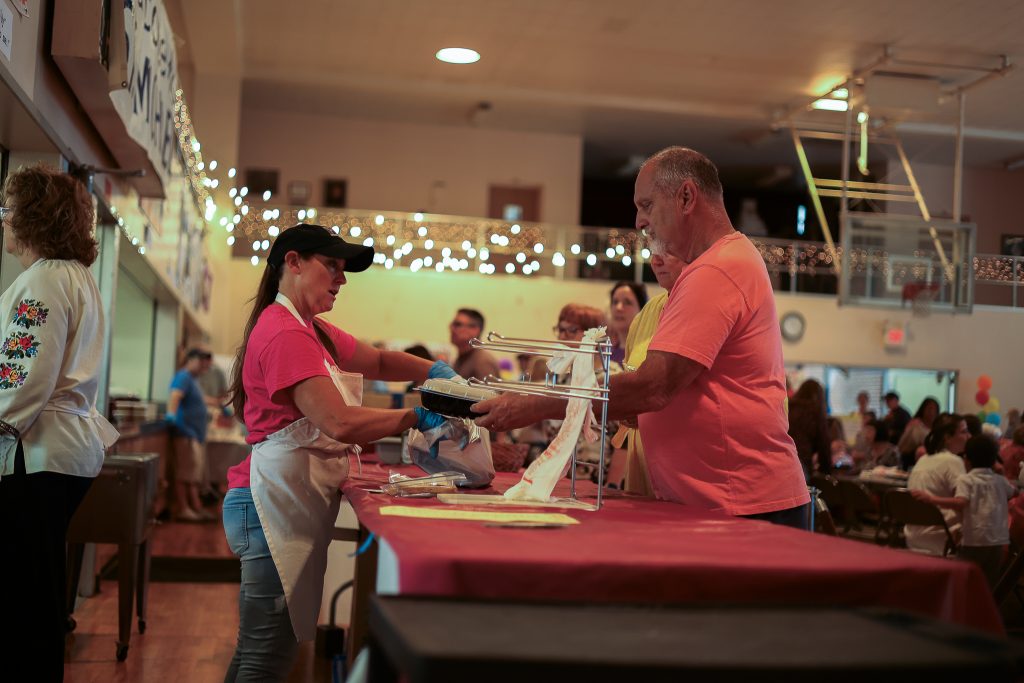St. Michael’s Greek Catholic Church hosted its annual cultural heritage festival on Sunday.
The St. Michael’s Carpathian Festival, held in the attached community center from 11 a.m. to 5 p.m., featured food, music, dancing and games. It highlighted the cultural heritage of the Eastern Orthodox Church and the immigrants from eastern and central Europe who migrated to Greater Binghamton and established a lively community. Attendees lined up at the entrance to purchase $1 food tickets that were exchanged for a variety of cultural and local specialties.
Sitting at the front of the hall was Elizabeth Fabian, 42, of Vestal, the adviser for the Junior American Carpatho-Russian Youth at St. Michael’s. Easter eggs imported from Czechoslovakia — a former state in central Europe — were being sold for $5, with the proceeds going toward the youth group. Prayer books, candles and palm crosses were also offered to guests.
Father James Dutko of St. Michael’s described the importance of the immigrants who moved to the northeastern United States and settled into the local community.
“My grandparents were immigrants, they came in 1906, 1907, from some of these villages in the old Austrian Empire,” Dutko said. “My grandfather worked in Esso Refinery in Bayonne for 40 some years, tough job. His four daughters and son [during the] Depression all went to college. They all got college degrees. They became teachers. His son became an officer in the Navy, in World War II he went to the Merchant Marine Academy. They became Americans — this was the American dream and they realized it.”
Dutko, originally from Buffalo, New York, moved to Freeland, Pennsylvania when he was young. His father was a priest and transferred to Binghamton when he was a sophomore in college. After spending almost 20 years as a priest in western Pennsylvania, he returned to Binghamton to join St. Michael’s, where he has been for 33 years. He described the church’s foundation as having been built by immigrants, many of whom worked for the former Endicott-Johnson Shoe Company.
“There was no diocese money, there was no czar sending stuff over here, there was no money,” Dutko said. “People were the shoemakers — saving their pennies, not buying their own houses, taking boarders in, doing all kinds of stuff for years, to build their own church. That was more important than anything else, that was the first thing — taking care of your soul. So, they built this beautiful place.”
There were multiple tables around the hall raising money for the church. Three women were sitting next to several tables filled with gift baskets and introduced themselves as “The Basket Queens.” Raffle tickets could be purchased and inserted into the corresponding container, and the raffle winners were announced toward the end of the festival. All money raised will go toward the church. Sue Fabian, one of the Basket Queens, said this festival was this year’s major fundraiser.
A baked goods sale was also held towards the back of the center, with both ethnic and American desserts being sold. Sara Trott, who has lived in Binghamton for nearly 57 years, described the significance of the festival to the community.
“I think every festival that takes place, people are happy to come, have a good time, eat, be merry, dance,” Trott said. “We’re going to have a live band here, and I think that in these times, it’s a reasonable cost to come here and enjoy. I really do.”
Dutko emphasized how the festival highlights how immigrant stories — past and present — are vital to the American experience.
“Immigration is demonized — people who came out of those roots better take a serious look at what they are saying, what they are doing, because their people were treated the same way,” Dutko said. “We better have to have a little compassion here.”



